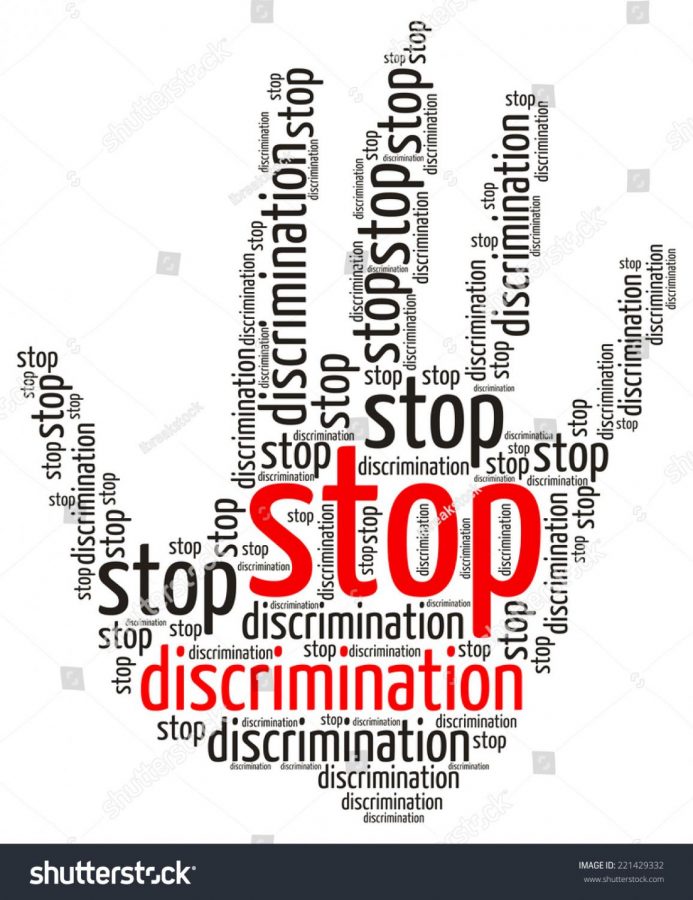Opinion: Discrimination for All
Free image form shutterstock.com
We can work together to stop discrimination in all its forms.
March 27, 2019
For many people, discrimination is a reality, especially in the United States, according to an NPR-Health New survey.
People of minority racial and ethnic groups state that they experienced discrimination in their daily lives. However, others say that their experience of discrimination was based on age, gender, income, education, or weight.
What is Discrimination?
Imagine walking through a parking lot, seeing a salesman who happens to be black and she walks faster to her car and locks the door. She locks the door not because she doesn’t like salespeople, but she saw a black man approaching her and panicked.
Another example? A man who appears to be Muslim walks up to a statue in the park. He sets something down in front of it but before the man can turn away, a cop is putting handcuffs on him, assuming he placed a bomb in a public park. Then the cop sees the flowers and a memorial plaque engraved with the words “In the memory of Janet.”
Discrimination is the unfair or prejudicial treatment of people and groups based on characteristics such as race, gender, age or sexual orientation. However, discrimination can be towards ANY group of specific people with a common characteristic.
Where does discrimination come from?
Discrimination comes from misunderstanding and the fear of difference. Discrimination is from the centuries on top of centuries of racism and hate.
Stemming from the ceaseless ignorance of people making unfair assumptions about what people with certain personal characteristics can and cannot do, creates discrimination.
What are the aftereffects of discrimination for an individual?
Discrimination for an individual can negatively impact a person’s employment, housing, loan application, business, access to medical services, access to education, and access to other public services.
This creates an atmosphere of fear and anger, of not being able to get jobs to provide for one’s self and family, housing for protection and shelter, education in order to receive the credentials to even apply for a job, and medical services for one’s health and family’s health.
Specific discrimination like racial, sexual, and religious discrimination can have more of a mental and physical result such as depression, anxiety, and stress.
What are the effects of discrimination among societies?
As far as the historical records show, every society or nation has experienced or come into contact with discrimination.
Extended, more extreme acts of discrimination include genocide, slavery, disenfranchisement, discriminatory immigration laws, and Apartheid, which in a society creates inferiority.
Inferiority is the condition of being lower in status or quality than another or others. This is more common among young children than you think.
In the case of Brown vs. Board Doll, black children were given a black and white doll to play with and when asked to describe each doll, they responded with good comments about the white doll and bad comments about the black doll.
This leads psychologists, Kenneth Bancroft Clark and his wife, Mamie Phipps Clark, to believe that discrimination and segregation have left a huge impact of inferiority among black children.
As a society, this affects us all, whether it’s mentally, physically, or financially. It creates an uncomfortable and unsafe environment for adults and children.
What are ways we as a society can end discrimination?
As a society, it’s our roles as a whole and as individuals to end what isn’t right. Discrimination among all is unfair and morally wrong.
Ways we as a society could create a path of ending discrimination is by, first, informing people, especially the youth, about discrimination and its effects.
Second, encourage others around us to respect each other’s differences. Knowing that we all come from different places and people, but we are all the same can help create a sense of equality.
Lastly, if someone is being discriminated against, you as an individual can help by speaking up against discrimination. Form a bond with someone who’s being discriminated against, and let them know they’re not alone.
Conclusion
Discrimination is the unfair treatment to a specific group of people or person because of their common characteristic connected to a specific type of group.
Anyone and everyone can experience discrimination and many people do have negative effects of discrimination.
Someone that is disadvantaged because of something beyond their control, is dehumanizing and wrong. No matter who you are or what you are seen as no one should be discriminated against.
In order to help come closer to a more peaceful world, each of us has to take control and say “this is enough,” and help out an end to discrimination by using ways of educating, encouraging respect, and standing up for victims of discrimination.
Makayla Jenkins is a junior at Pinole Valley High School.


